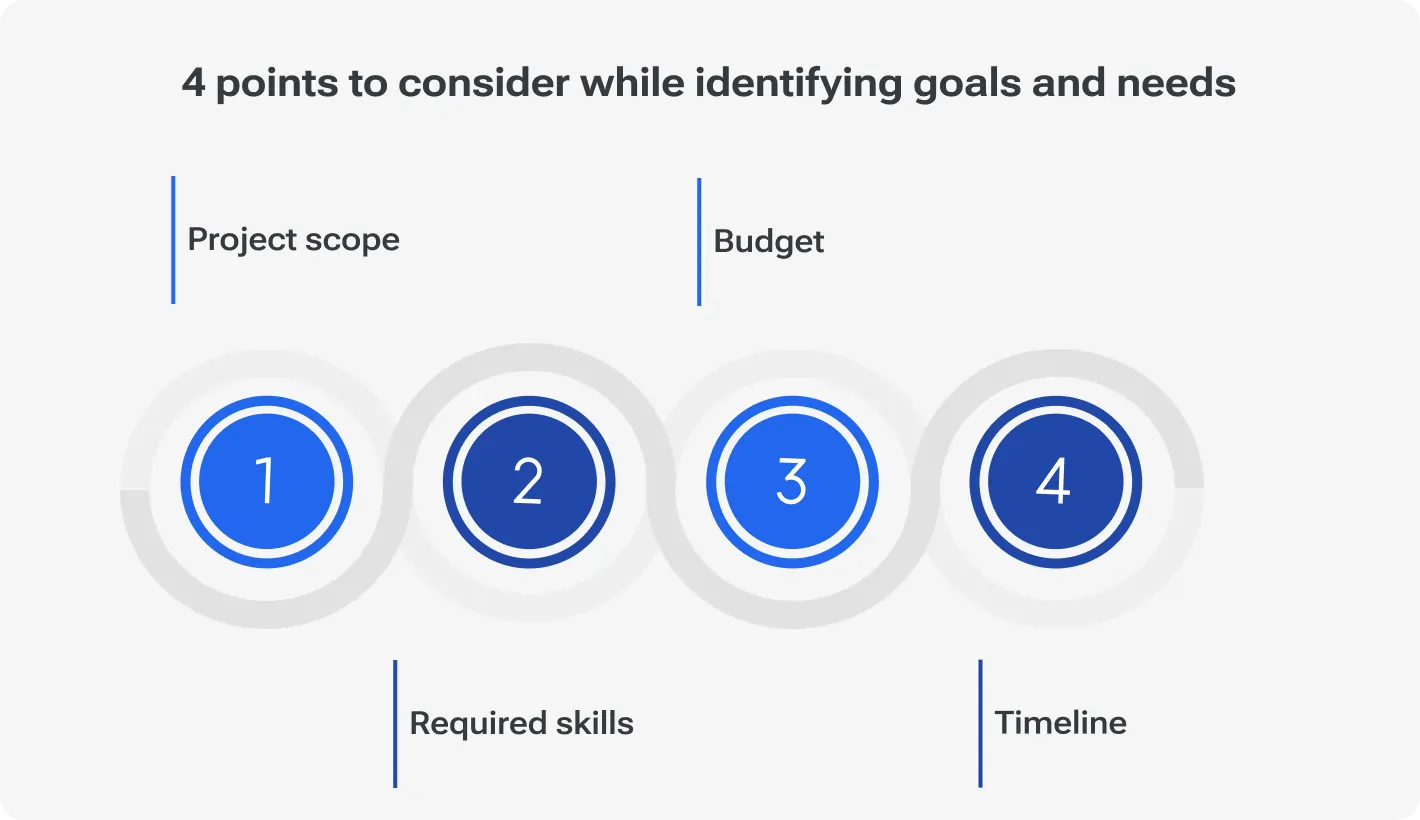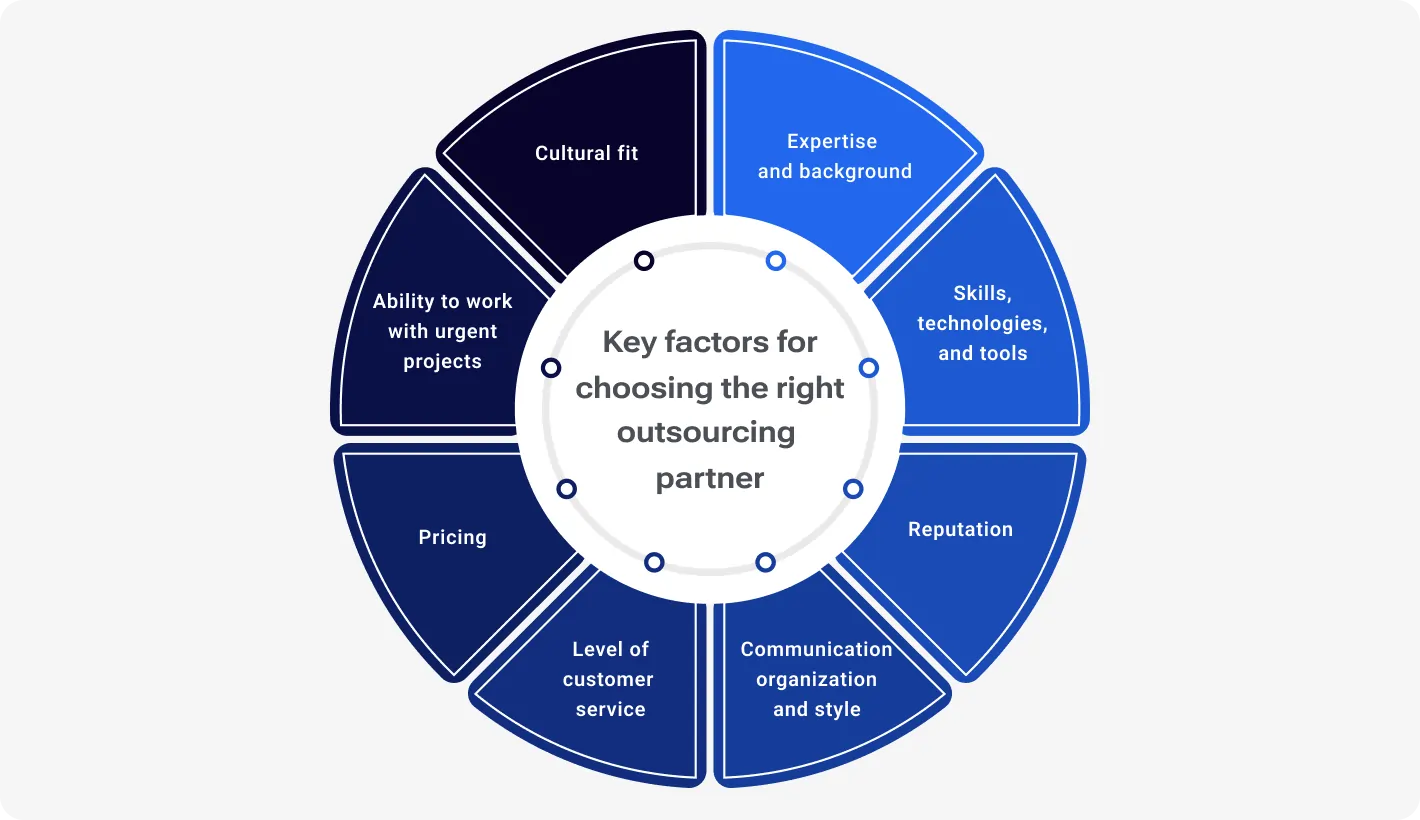Outsourcing isn’t just a cost-saving move. When done right, it can make your team 45–65% more efficient, cut your budget by a quarter or more, and help you launch faster than competitors. No surprise that, according to Deloitte, 3 out of 4 CEOs already outsource part of their IT.
The problem? These results don’t happen with just any vendor. Pick the wrong one, and you get delays, poor quality, and wasted money. Pick the right one, and you gain a dedicated partner who delivers on time, within budget, and at the level you expect.
This article walks you through a practical guide to choosing the right outsourcing partner and setting up a collaboration that actually works.
End-to-end solutions with predictable budgets, a time-to-market advantage with budget savings of up to 50%
Step 1: Identify your goals and needs
Before you start looking for a contractor, you need to clearly define what you need one for. This will help you make the right choice and properly organize cooperation in the future. During planning, consider the 4 below-listed main points that will directly influence how to choose an outsourcing company.
Project scope
Distinctly outline the business goals that you want to achieve by ordering IT tasks completion from a partner. They should be as detailed as possible, measurable with specific metrics, realistic to achieve, and time-bound.
Build a plan of tasks that will help you achieve your objectives and estimate their scope. This will help you further determine which specialists you need, how many professionals to involve in the work, and how quickly it is possible to complete your project.
The ROI of outsourcing: Measuring success
Required skills
Depending on the previous point, you can determine what expertise and experience the engineers should have to accomplish your tasks. Once you have decided on this, during further choice of a partner company, pay attention to whether its specialists are proficient in the technologies and areas you need.
Budget
Consider the amount of money your company is willing to spend on IT tasks. This will determine which company with what pricing policy it is better for you to prefer. However, keep in mind that quality and price are always interrelated, so it is not worth choosing too cheap services.
The previous point can also help you estimate the required budget for the project. If your goals can be achieved with basic skills, the choice of outsource service provider will cost you less. However, if you need specific expertise or the extensive experience of a senior-level professional, you may have to consider allocating a larger budget to get a quality result.
Timeline
You need to set a deadline for your project. It is important to be realistic in doing so. Consider the number and complexity of tasks that are needed to achieve your goals. Also, take your budget into account. It may cost more to complete a project on an urgent basis.
When choosing a partner, right away stipulate whether the team will be able to handle the tasks within the deadline. Not all companies will be able to take on your project immediately and deliver it on an urgent basis. This will also influence your choice of the ideal partner.
Step 2: Select an outsourcing partner, considering 8 essential criteria
Have you already clearly and thoroughly defined your goals and needs, outlined a plan of tasks, determined what skills external IT specialists should have, and set a budget and timeline? Then it is time to get into action and begin the search — if you’re not sure how to find an outsourcing software development company, the following 8 criteria will guide you.
Expertise and background
Some projects require specific expertise, such as, for instance, blockchain, AI/ML, or cybersecurity. If you have such tasks to be done, be sure to check whether the company has experience in this very area.
It's also better to choose a partner who already has some background in the niche your business operates in. For example, if you are a fintech organization, pay attention to whether the company has successful cases of work in this particular field. This will indicate that the professionals on their team know the nuances and intricacies of this industry, such as regulatory compliance in the specific niche and country, etc.
Devico has extensive experience of working in numerous industries, such as:
If your company operates in one of the above-listed fields, feel free to contact us to consult and develop a follow-up action plan.
Skills, technologies, and tools
Pay attention to what skills the team members have and what technologies they are proficient at. Compare that information with the expertise required – this comparison is at the core of choosing an outsourcing partner. If they match, you can safely consider the company as your future IT partner on the way to realizing your business goals.
Also, pay attention to what tools the company uses. A reliable outsourcing service provider has well-established processes and uses the latest tools to automate, increase efficiency, and optimize workflows.
Devico has specialists with a variety of diverse expertise and skills. Our professionals are proficient in a wide range of programming languages, frameworks, and databases that enable them to handle frontend and backend development tasks for both PC, Android, and iOS devices.
There are also engineers with specialized expertise in such areas as blockchain, cloud, AI/ML, DevOps, and more, in our team. Moreover, we use modern tools to optimize, structure, and improve the efficiency of work processes.
Reputation
To choose a trustworthy outsourcing IT partner, inspect its reputation carefully. You can do the outsourcing partner evaluation with the help of the following methods.
Researching case studies and success stories
You can find them on the company’s website itself. Pay attention to how detailed the following points are described:
team's participation in the work;
Additionally, consider whether the company has successful cases of cooperation with companies operating in the same industry as yours.
Checking testimonials and references from other clients
Positive feedback from previous clients will help you make sure that the company can fulfill your needs. When studying testimonials, pay special attention to the things that are crucial to you. They may be different for each organization: speed of work, quality of communication, etc. Also, consider whether there are video testimonials. They guarantee that the references are real.
Communication structure and style
Convenient and effective communication is crucial when working with any outsource service provider. Regular and open communication will help avoid misunderstandings, misalignment, as well as non-compliance of the result with the client's expectations.
To make sure that interaction with your partner is going to be smooth and efficient, clarify how the company usually communicates with its customers. A professional outsourcing IT partner must be used to keeping in touch all the time, attending regular meetings, and reporting on their work timely.
Devico’s specialists guarantee seamless communication thanks to:
willingness to use any communication channels convenient for the customer;
agreeing on the ways and frequency of communication when signing a contract;
readiness to participate in video calls;
providing regular reports on the work already done and being open to constructive feedback and improvements.
How to manage an outsourced development team effectively
Level of customer service
It's important that the outsourcing vendor doesn't just fulfill its basic duties, but truly cares about each of its customers. Sometimes it's not enough to just develop a product or accomplish a certain scope of tasks. In some cases, a client may need support after the main part of the project has been completed. And it is important to find out from the very beginning of the work whether the company is ready to provide it.
Devico doesn’t abandon its clients after the main scope of work is done. Our specialists are ready to provide post-deployment support in the form of:
making refinements and improvements;
adding new features when needed.
Pricing
Each company has a different pricing policy. And it is important that it coincides with your budget. Choose an IT outsourcing partner with an optimal price-quality ratio to ensure long-term collaboration. Study the average prices on the market and be guided by them. Do not chase after excessive cheapness, as it may indicate poor quality.
Also, make sure that the company will not go beyond the set budget and will not ask for additional payments. For example, Devico guarantees no hidden fees and fixes the maximum budget when signing the contract.
Ability to work with urgent projects
Not all IT service providers take on time-sensitive projects. And some unscrupulous companies may promise to do the project on time and then ask for a delay.
So if you have very tight timelines, make sure that the outsourcing partner of your choice has proven experience in handling urgent projects. Also, discuss tasks and deadlines in advance and specify them in the contract, so that you can be sure that you are going to get the result timely.
Cultural fit
Every organization has its own culture and corporate ethics, so how should a company select an outsourcing provider that aligns with its values? If your rules and the traditions of your partners are dramatically different, this can lead to disunity, conflicts, and reduced performance.
Therefore, it is important to make sure that you can get on the same page. To do this, it may not be enough to look through the information about the company. To see if you can get along well with an outsourcing IT partner, schedule a video call or order a small pilot project to see the team in action.
Step 3: Make sure you have really found the right fit
When you have already made a preliminary choice of a suitable partner based on the above-mentioned criteria, you need to check for sure that you can really get along and work together well.
Thorough additional research
In addition to looking through the testimonials and case studies on the company's website, analyze its reputation on external resources. Find reviews from previous clients on the web and check social network feedback as well.
Interview
It's imperative to socialize to see if you're a good fit for each other. Arrange an interview and find out everything you want to know. Here are some good ideas of questions if you’re asking yourself how should a company select an outsourcing provider:
-
What background does the company have in your niche?
-
In what way and with the help of what technologies has the team completed the tasks similar to yours?
-
Does the company guarantee to meet deadlines? Is there any compensation in case of delays?
-
How does the company manage its employees and deal with possible conflicts or other problems inside the team?
-
How is the quality of work assured?
-
How does the team communicate with clients?
-
What type of reporting and how often are they willing to provide?
-
What is the process for starting up? How long will it take from signing a contract to beginning the work on the tasks?
-
How quickly is it possible to scale and engage new engineers to the project if needed?
-
Does the company provide post-deployment support if needed and how?
-
Employees from which countries and time zones are available? (this is especially important if you have an urgent project and would like the work on it to be done 24/7).
You can also think in advance about a list of questions that are important to you. It is better to ask open-ended questions rather than questions that can be answered briefly with a “yes” or “no”. Detailed answers will help you learn more about the company, its experience, and its capabilities.
During the interview, make notes of essential information from the answers, so that you don't forget key points. This is especially crucial if you are choosing from several companies.
Pilot project
During the interview, you can learn basic information about the company's background and style of work. But how do you see an IT service provider in action? For this, you may need to make a trial order. Allocate a small amount of tasks and assign your potential partner a pilot project. This will help you understand:
the company’s approach to completing the tasks you need;
the efficiency and productivity of the team;
how the specialists meet deadlines;
how communication with the company takes place during work.
Based on your impressions from a small first set of orders, you will be able to make the right decision on whether to cooperate on an ongoing basis or not.
Step 4: Evaluate a proposal from an IT company of your choice
When you have already chosen a certain company, you can get a proposal from it on what services and how it is ready to provide you. What to pay attention to in such a case? Here are 4 main aspects to consider:
Certainty. Make sure that the plan of cooperation is specified clearly, unambiguously, and in detail – this is one of the most overlooked steps in choosing an outsourcing partner.
Pricing policy. Check if it is clear, transparent, and guarantees no hidden fees;
Flexibility. Pay attention to whether the proposal provides an opportunity for change. Market conditions do not stand still, and your business can evolve and adapt its goals to the realities. Therefore, it is important that the outsourcing partner is ready to adjust to project changes, as well as scale both up and down as needed;
Risk management. In any job, force majeure can occur. Unforeseen circumstances are not always the fault of the outsource service provider, but they should still have a clear risk management plan. However, it must be prepared to deal with the consequences. The proposal should outline a plan of action in case of problems.
Outsourcing contracts: What you need to know
Step 5: Build and maintain successful outsourcing partnerships
Making the right choice of partner is only half of success. You also need to build the right relationship. Here are 3 tenets of effective interaction with an external IT team:
Detailed and transparent contract. To avoid misunderstandings and problems, you should specify as many details as possible about your upcoming collaboration in the contract. All points should be clear and unambiguous – this is one of the foundations of how to choose an outsourcing company wisely. The document should include information about what result the client is going to receive, within what time frame, and at what price;
Open and continuous communication. To communicate effectively, you and your partner should stay aligned with each other. To do this, you need to keep in touch at all times. Use convenient communication channels and hold regular meetings to build trust with your outsourcing IT partner. This will keep the team up to date with all the details needed to complete tasks. It will also prevent misunderstandings and problems. And, even if they do arise, by communicating regularly and honestly, you will be able to resolve them early on and prevent them from escalating;
Progress track and constructive feedback. To ensure that the end outcome of the work matches your expectations, it is important to monitor intermediate results. To do this, request regular and detailed progress reports and provide detailed and objective feedback on them. This will allow the company to adapt to your goals and cater to your needs in the best possible way.
To conclude
Outsourcing can help you significantly increase efficiency, save budget, and shorten time to market. However, all the advantages of this work model can be perceived only if you select the appropriate IT company to cooperate with.
To make the right choice and know how to find an outsourcing software development company that fits, clearly define your goals, analyze potential vendors, hold an interview, and assign a pilot project. When choosing, pay special attention to such criteria as:
expertise and experience;
skills, technologies, and tools;
willingness to be involved in urgent projects;
Book a consultation and let Devico bring your IT ideas to life!
Support your business growth with a global talent pool of experienced software engineers





